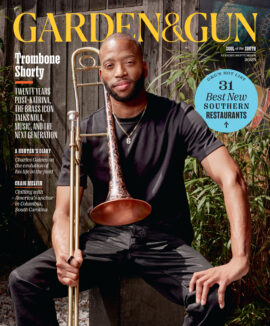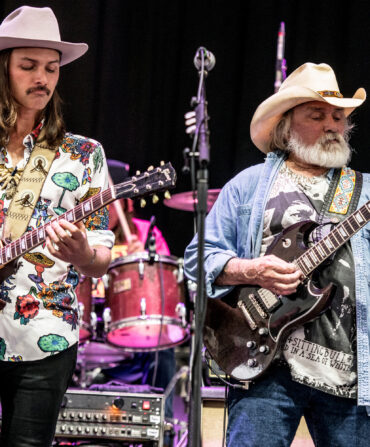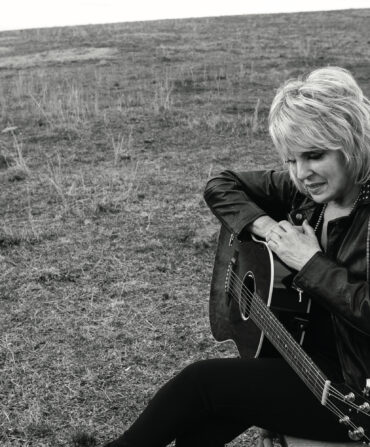Artists
Gregg Allman’s Restless Soul
The spiritual leader of the Allman Brothers is feeling the blues––in a good way
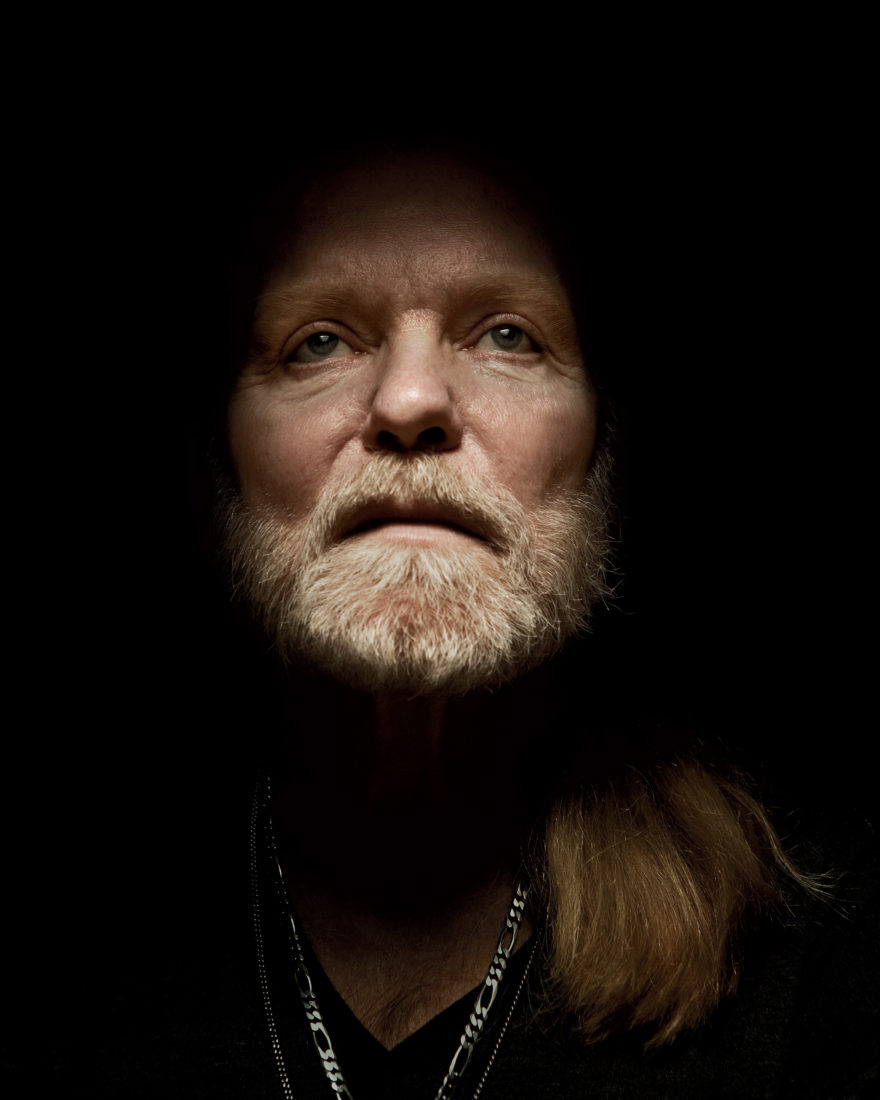
Photo: Peter Yang
“C’mon, you can do it!”
Duane Allman was goading his younger brother, Gregg, in the backyard of their house in Daytona Beach, Florida. Duane had been drinking all day, and he was growing impatient. “Well, you’re just a chicken,” he scoffed.
It was 1965, and Gregg and Duane were at a crossroads. Not even twenty, they had crisscrossed the South playing in a band called the Allman Joys. They did gigs at rough joints like the Stork Club in Mobile, Alabama, where they played six nights a week, five sets a night, forty-five minutes per set. Gregg was weary of the road and ready to give up and go to dental school—after a week of playing the Stork, he and Duane each pocketed only $111—but if he pursued dentistry, he would be in debt and stay in debt. He decided to continue with the band. The only problem was, Gregg was eighteen and about to get drafted to fight in the Vietnam War. Duane—who was exempt because their father was dead and he was the oldest son—had cooked up a scheme to get his young brother out of the draft: have Gregg shoot himself in the foot in order to get a medical pass.
“I’ve invited these nice ladies over here to see a foot shooting and you’re going to let them down?” Duane screamed. The girls began to cry. Gregg had drawn a target on his moccasin, placing it carefully between two of the bones in his foot so as to cause minimal damage. After more berating by Duane, Gregg slammed down two more shots of whiskey, made a quick phone call, and came back outside with his Saturday night special handgun. In the distance, a siren wailed. Then, BAM! Gregg had done it. In a remarkable moment of lucidity, he had called the ambulance before he pulled the trigger. The next day, he hobbled into the Army recruitment office and got his medical exemption. The Allman Brothers Band was born.
Southbound
Today, just a few weeks before Christmas, Gregg Allman is grimacing in pain for an entirely different reason. He had a liver transplant last summer and isn’t supposed to lift anything heavier than twenty-five pounds. But it’s unseasonably chilly in coastal Georgia, where he now lives. Yesterday he went out and gathered some firewood and tried to bring it into the house. “I had to take baby steps,” he says, shifting uneasily in an upright chair. His cozy blue-and-white-painted living room is loaded with artifacts, everything from Grammy Awards to photos of his father to books of poetry by Poe and Tennyson as well as an ornately decorated Christmas tree with piles of presents underneath—but at the moment none of that is comforting. “At one point I heard my stomach rip and now I’m in so much pain,” he says. “It was just stupid.”
After years of living in California’s Marin County, Allman moved back to Georgia in 1999, to Richmond Hill, a sleepy fishing town about twenty miles from Savannah. (The “Big House,” in Macon, where the band lived in the seventies, is now a museum.) After you enter through a gate and drive down a winding road covered by giant oaks dripping with Spanish moss, you arrive at his large brown-wood-paneled and brick house—not a mansion by any means. A sign at the end of the driveway reads “Valhalla,” and it’s here that Allman has found his sanctuary. He has access to the water and loves to head out with friends on his fishing boat, spending hours in the Lowcountry marshes or just sitting on the deck chairs watching the sunset from the dock. “I just had to get back to the South,” he says. “It’s not as hectic, I’m close to my mama, and this is where it all began and where it will eventually end.” He winks. “But hopefully not for a long, long time.”
His recent liver transplant was necessitated by his having contracted hepatitis C back in the sixties—probably due to an unclean tattoo needle. Back in the hippie heyday, sharing needles was commonplace. The disease lay dormant for years before worsening in early 2010. Constant drug and alcohol abuse in the seventies and eighties didn’t help matters (this is a man who once received a brick-size block of pharmaceutical-grade cocaine as a wedding present). He gave up alcohol in 1996 after he was so drunk at the 1995 ceremony to induct the Allman Brothers Band into the Rock & Roll Hall of Fame that the presenter, Willie Nelson, had to help him onstage and asked, “Damn, Gregory, you all right?”
“I wasn’t all right; those were the bad-boy days,” he says. “And I don’t miss them one bit. I didn’t spend a whole lot of money on drugs. Certain amounts, but a lot of people just gave them to me. Thank you very much.” Now that he’s completely sober, the only drugs Allman takes are antirejection meds such as Prograf.
“I was one of the first people he told [about the transplant],” says Allman Brothers guitarist Warren Haynes, “and it was serious stuff. But that same night we were laughing and cutting up just like nothing had ever happened. That’s a testament to his resilience. He’s faced everything head-on. I’m very proud of him and the way he’s handled everything.”
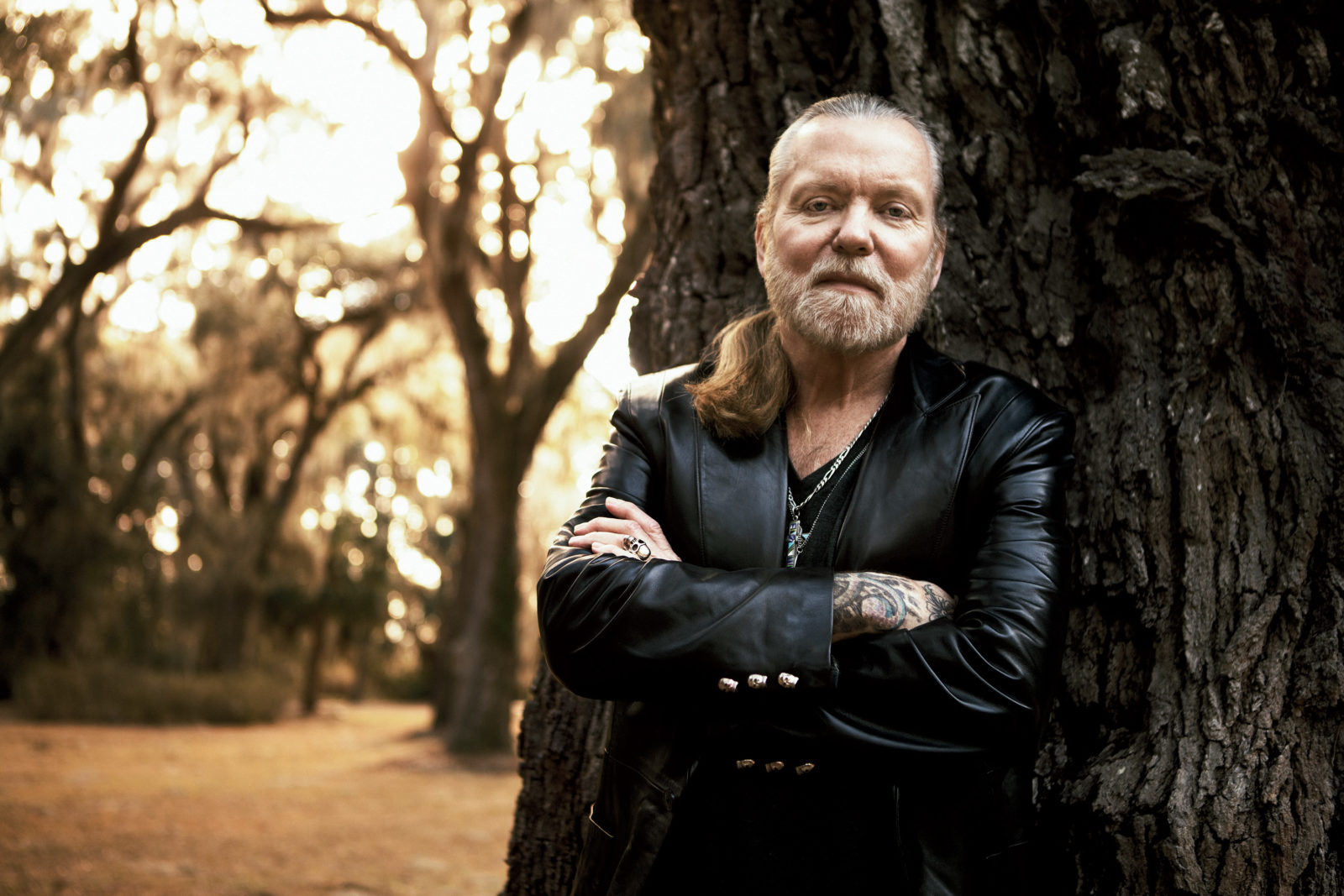
Photo: Peter Yang
Southern Man
Allman, photographed at his home outside Savannah, on January 3, 2011.
Feeling Low
Like anyone who has undergone major surgery, Allman has good days and bad. Today is not one of his better moments. He speaks slowly and deliberately, often closing his eyes for so long he almost seems to have fallen asleep. But then he snaps out of it, becomes engaging, and chortles with a gravelly laugh. “Sorry, man, these drugs can really mess me up,” he says. “They make me tired and make my hands shake.” He has to drink more than two quarts of water a day, and he gets up to go to the bathroom a half dozen times in less than two hours. “I hate it,” he says, picking at a plate of fruit his housekeeper and right-hand woman, Judy, has brought out for him. He’s more exhausted than usual, coming off a string of Allman Brothers dates in November as well as a promotional tour for his new solo album, Low Country Blues.
Consisting almost entirely of covers from legends like Muddy Waters and more obscure (but equally revered) blues artists such as Sleepy John Estes and Skip James, Low Country Blues is stirring and emotional, a low-key companion to the more raucous, epic jams of the Allman Brothers Band. “You don’t have to be an ABB fan to like this,” says Haynes, who cowrote the only original, “Just Another Rider.” “It’s moody, but it’s Gregg living his life through these songs.” Allman hadn’t recorded a solo record since 1997 and had no interest after Allmans producer Tom Dowd, a close friend, passed away in 2002. But in 2009, after a summer Allman Brothers tour, Gregg’s manager convinced him to go to Memphis to meet with T Bone Burnett. The producer and his crew were in Memphis measuring the dimensions of the city’s legendary Sun Studio so Burnett could build an exact replica next to his house in Los Angeles. “I had never heard of T Bone, and I thought he’d just jive me,” Allman admits. “But the first thing he said to me was ‘Tom Dowd was such a hero of mine.’ And I thought, well, this cat might be all right.”
Still, Allman was hesitant, but Burnett gave him a hard drive of more than nine thousand songs, and listening to them transported Allman back to the old days of touring in a van with Duane. “We used to listen to this radio station, WLAC from Nashville, Tennessee, that you could only get at night,” he says. “They played Muddy Waters, Howlin’ Wolf—you name it, they played it. It was the first time I heard [jazz organist] Jimmy Smith. I always fantasized playing a Hammond, but at the time there were too many damn buttons to push.”
Allman flew to Los Angeles and cut Low Country Blues in two weeks. “We took the album cover photo right on that road near where Forrest Gump runs and runs in the movie,” he says, laughing. “This area means so much to me. I just wanted to give respect with these songs. I think Duane would have really liked it, too.”
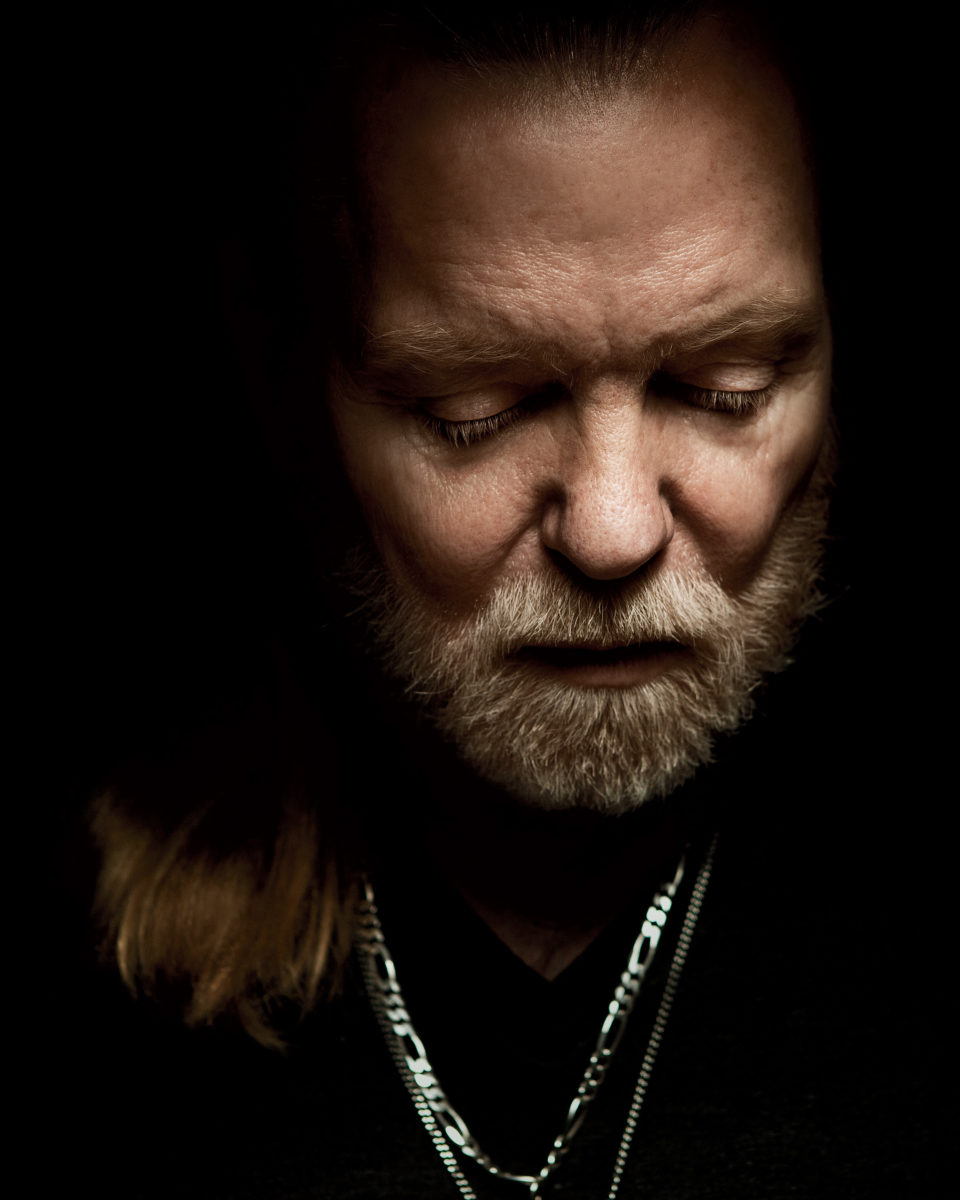
Photo: Peter Yang
The Lost Brother
The specter of Duane hovers constantly over Gregg. In addition to being the older brother, Duane had also assumed the role of de facto dad after their father, Willis, was murdered by a hitchhiker near Norfolk, Virginia, in 1949. Given that it’s close to the holidays, there’s a flutter of activity at Gregg’s house: He has five children (with five different women), each of whom he has a tight relationship with, and he’s prepping for a visit from his ninety-three-year-old mother. “Mama A, she’s my queen,” he says. It’s still a little eerie when Galadrielle, Duane’s only child, pops into the living room to say hello to her uncle. Skinny like her father, with long, curly brown hair, she peeks around the wall. “You sleep all right, darling?” Gregg asks. “Oh yeah,” she says. “It’s so peaceful here. You sleep all right?” “I did, finally,” Gregg answers. Galadrielle disappears into the kitchen and Gregg closes his eyes. “Duane is always hanging around,” he says. “At least I sure want to think he’s here. I feel a lot of him coming through me, more and more, especially after I got sober. Sometimes I hear myself say something and think, Wait a minute, that’s not what I meant to say, that’s what Duane would have said. It’s real freaky.”
“Gregg is a quiet giant; he’s the kindest soul you’ll ever meet,” says guitarist Derek Trucks, a member of the ABB since 1999 and the nephew of band drummer Butch Trucks. “Duane was the get-in-your-face guy. Gregg talks about Duane a lot, but he’s comforted by the fact that he and the band are playing better than ever. Duane would have been real proud of him.”
Duane died in a motorcycle accident in Macon, Georgia, in 1971, just months after the band released At Fillmore East, considered by many to be the greatest live record of all time. The band—then including bassist Berry Oakley, guitarist Dickey Betts, and drummers Butch Trucks and Jaimoe Johnson—sputtered, but released the 1972 classic double album Eat a Peach, which contained several songs on which Duane played. After adding keyboardist Chuck Leavell a year later, the band was dealt another blow when Oakley died in another motorcycle accident in Macon, three blocks from where Duane was hit. But this time, there was no doubt about continuing on. Duane and Berry were buried side by side in a Macon cemetery, and less than two months later the Allman Brothers played a New Year’s Eve show in New Orleans, with Lamar Williams taking the place of Oakley.
Despite losing two founding members and the guiding force of Duane, the Allman Brothers quickly became one of the most popular bands in the country. But with success came volatility. Every member aside from Johnson was using drugs heavily, and Gregg married Cher (his third wife), going all Hollywood and separating himself from the rest of the group. Betts and Allman dove deeper into their own solo careers before disbanding the Allmans in 1982, then reuniting in 1989 to celebrate their twentieth anniversary. Still, the lineup constantly changed. Warren Haynes was an off-and-on member, and while the rest of the band was now sober, Betts continued to abuse substances (though Betts denied it). In 2000, the band fired Betts for “personal and professional reasons,” after which Haynes rejoined full-time and Derek Trucks assumed Betts’s role.
Rambling On
The wounds of Betts’s and Allman’s disintegrated relationship are still raw. “Dickey loved to fight,” Allman says. “All of us were sober and we just got sick of it.” Sometimes significant events can help bygones be bygones, but Allman says he hasn’t heard a word from Betts since his transplant. “I thought I might,” he says. “I got nothing against the guy. I hope that he finds himself.” He ponders his words for what seems like an eternity. “I wish him well.”
Since Betts’s departure, the Allmans have recaptured the glory of their late-sixties and early-seventies heyday. Listen to At Fillmore East, then listen to a recording of a show from last November. Sure, Allman’s voice is more gravelly, but it’s still a powerhouse, and the combination of Haynes and Derek Trucks is positively dynamite. “The minute he opens his mouth you know it’s Gregg Allman,” Haynes says. “And that’s the best compliment you can receive.”
Despite Allman’s up-and-down days, there’s no slowing down. The band is again holding court at New York’s Beacon Theatre in March for a nearly monthlong series of dates. It will headline the Wanee Music Festival in Live Oak, Florida, in April. A summer tour will follow. “Warren and Derek, they’re just perfect,” Allman says. “Sometimes I look over at Derek and can see Duane. I love them to death. Oteil [Burbridge, the band’s current bassist] the same way.” Despite Allman’s legendary status, he remains extremely shy. He still gets stage fright before every show, but as soon as he gets behind his Hammond, the shaking in his hands stops.
Now, save for his two dogs, Maggie and Otis, the house is silent. He lives alone (he was recently divorced for the sixth time and vows never to marry again, though he admits he would like to find a companion), and though friends come in and out of the house, you get the feeling that he’s much happier on the road. “I am, I really am,” he says. “It can get tiring, but I love playing and being around the guys. This house is great, but it can get lonely.” Almost on cue, his road manager, Vid, comes in to tell him that Gregg’s new earphones for sleeping on the bus are ready. In a few hours he’ll head to Asheville, North Carolina, to play with Steve Miller and Haynes, at Haynes’s annual Christmas Jam benefit show. “That’s great, man, thank you so much,” he says to Vid. He shifts in his seat again. “I’m so glad that I wasn’t gonna be an invalid. Or have this thing take my playing away. I prayed on that one. I would have been lost.”
But he’s here, and the playing—and his health—will only get better. “I want to do this at least ten more years,” he says, standing up and gesturing to the garage, where he’ll show off his collection of motorcycles. “I still have something to prove, if only to myself.” He gives a quick tour, then goes back inside, not wanting to linger in the chilly stillness of the garage. But at about 5:45, just as the sun drops behind the marsh, Allman boards the tour bus for the overnight drive to Asheville. For now, at least, the road indeed goes on.

